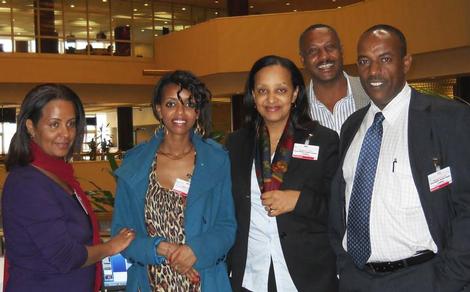The Health Policy Project ended in 2016. Work continued under Health Policy Plus (HP+) until 2022.
NEWS & VIEWS
JULY 8, 2011
Posted by Priya Emmart, HPP Senior Policy Advisor
A decade after the historic "Meeting the Reproductive Health Challenge" gathering in Istanbul, Turkey, a broad spectrum of stakeholders met in Addis Ababa, Ethiopia, from June 20-24, 2011, to celebrate and build on the significant progress in resource mobilization for reproductive health (RH) supplies. "Access for All: Supplying a New Decade for Reproductive Health," co-hosted by the Reproductive Health Supplies Coalition (RHSC) and Federal Ministry of Health (FMOH) of Ethiopia, focused on addressing the gap in resources required to satisfy unmet need for contraception and make essential RH supplies available in low- and middle-income countries. The RHSC estimates that as many as 215 million women currently wish to protect themselves from "unintended and potentially unsafe pregnancy" but are not using modern contraception.
The meeting provided an opportunity to share the Health Policy Project's (HPP) new GAP Tool for Financing Family Planning. GAP - which stands for Gather, Analyze, Plan - is a strategic planning tool to help advocates frame the right "ask." The tool links a country’s family planning (FP) goals with what it will cost to reach those goals. It represents the process of gathering, analyzing, and planning at the country level to project the contraceptive, service provision, and program support funding gaps.
 |
Delegation from Ethiopia (from left): Senait Tibebu (HPP/Futures Group), Rahwa Belay (FMOH), Dr. Negist Tesfaye (FMOH), Fikru Bekele (USAID), and Dr. Mengistu Asnake (Pathfinder International). Photo courtesy of HPP. |
During a pre-conference event organized by Population Action International, HPP introduced the GAP Tool to delegates from five countries: Bangladesh, Ethiopia, Nigeria, Tanzania, and Uganda. The closed session enabled country delegates to deliberate on existing challenges and successes and to begin to identify issues for RH supplies from the country perspective. The country delegates included a broad group of FP stakeholders from each country, including ministry officials, implementing partners, logistics experts, and representatives from the private manufacturing and social marketing sectors.
HPP also collaborated with high-level leaders to share findings from the pilot GAP analyses in Ethiopia and Nigeria during the first day of the full meeting, as a component under the pillar on "Aspects of Country Ownership." Dr. Negisht Tesfaye - Head of the Urban Health Directorate and National Coordinator for Maternal, Newborn, and Reproductive Health for the FMOH - presented findings from the Ethiopia application of the tool. The Nigeria presentation was introduced by Dr. Bose, Head of Reproductive Health for the Nigerian FMOH. Participants encompassed representatives from USAID, UNFPA, country delegations, and other implementing partners. Ethiopia and Nigeria are two countries of keen interest to supporters of the RHSC and it is hoped that the findings from the pilot analyses will help provide in-country stakeholders with the data needed to advocate for country leadership and ownership of FP programs.
Finally, HPP was invited to conduct a hands-on session on behalf of the Resource Mobilization and Advocacy Working Group within the RHSC. Priya Emmart, HPP Senior Policy Advisor, and Senait Tibebu, Senior Technical Advisor for Futures Group in Ethiopia, walked country delegates and donor representatives through the process of applying the tool and using the findings and provided a draft instruction manual to support follow-up use.
What's New
- Something to Build On: “Innovation Exchange” Celebrates the Health Policy Project’s Close and a New Beginning
- What Will it Take for Tanzania to Achieve ART Targets and Ensure Long-Term Sustainability of the HIV Response?
- Helping Kenya’s County Leaders Advocate for Increased Health Investments
- HPP Holds Working Meeting on Ensuring Responsible PEPFAR Transitions for Key Populations
- Health Policy Project Celebrates 2016 International Women's Day
- HPP Staff Participate in White House Conference on HIV Stigma Reduction

